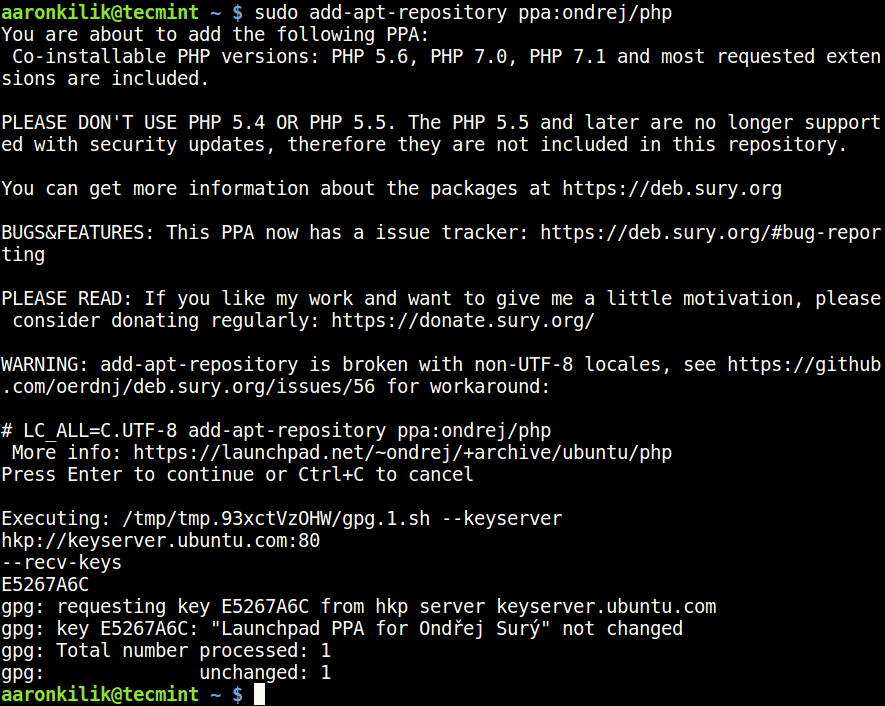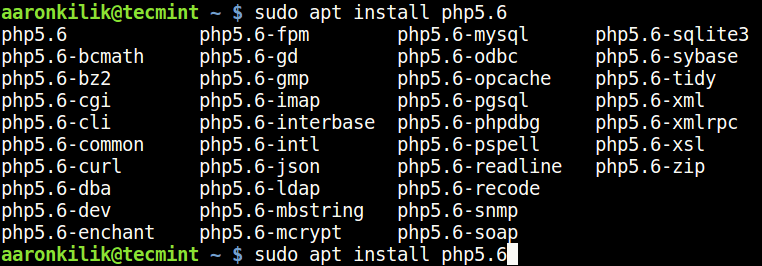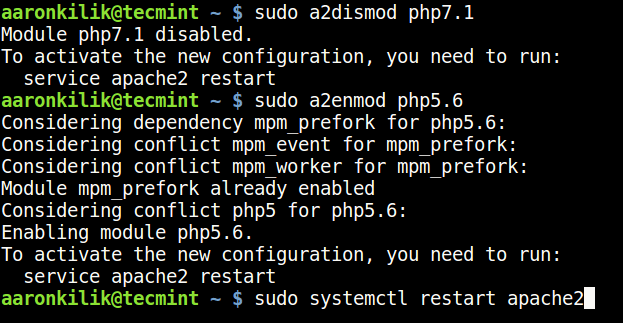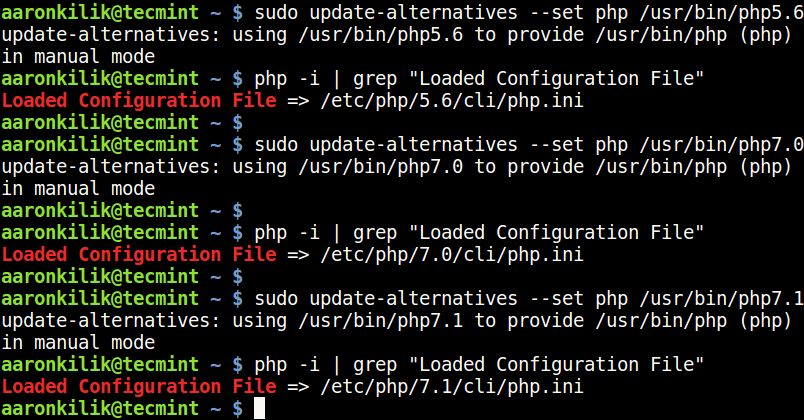Table of Contents
PHP (recursive acronym for PHP: Hypertext Preprocessor) is an open-source, popular general-purpose scripting language that is widely used and best suited for developing websites and web-based applications. It is a server-side scripting language that can be embedded in HTML.
Currently, there are three supported versions of PHP, i.e PHP 5.6, 7.0, and 8.0. Meaning PHP 5.3, 5.4, and 5.5 have all reached the end of life; they are no longer supported with security updates.
In this article, we will explain how to install all the supported versions of PHP in Ubuntu and its derivatives with the most requested PHP extensions for both Apache and Nginx web servers using an Ondřej Surý PPA. We will also explain how to set the default version of PHP to be used on the Ubuntu system.
Note that PHP 7.x is the supported stable version in the Ubuntu software repositories, you can confirm this by running the apt command below.
sudo apt show php OR
sudo apt show php -aShow PHP Version Information
Package: php
Version: 1:7.0+35ubuntu6
Priority: optional
Section: php
Source: php-defaults (35ubuntu6)
Origin: Ubuntu
Maintainer: Ubuntu Developers <ubuntu-devel-discuss@lists.ubuntu.com>
Original-Maintainer: Debian PHP Maintainers <pkg-php-maint@lists.alioth.debian.org>
Bugs: https://bugs.launchpad.net/ubuntu/+filebug Installed-Size: 11.3 kB
Depends: php7.0
Supported: 5y
Download-Size: 2,832 B
APT-Sources: http://archive.ubuntu.com/ubuntu xenial/main amd64 Packages
Description: server-side, HTML-embedded scripting language (default)
PHP (recursive acronym for PHP: Hypertext Preprocessor) is a widely-used
open source general-purpose scripting language that is especially suited
for web development and can be embedded into HTML.
.
This package is a dependency package, which depends on Debian's default PHP version (currently 7.0).To install the default PHP version from the Ubuntu software repositories, use the command below.
sudo apt install phpInstall PHP (5.6, 7.x, 8.0) on Ubuntu Using PPA
sudo apt install software-properties-common
sudo add-apt-repository ppa:ondrej/php
Add PPA in Ubuntu
2. Next, update the system as follows.
sudo apt-get update3. Now install different supported versions of PHP as follows.
For Apache Web Serve
sudo apt install php5.6 [PHP 5.6]
sudo apt install php7.0 [PHP 7.0]
sudo apt install php7.1 [PHP 7.1]
sudo apt install php7.2 [PHP 7.2]
sudo apt install php7.3 [PHP 7.3]
sudo apt install php7.4 [PHP 7.4]
sudo apt install php8.0 [PHP 8.0]4. To install any PHP modules, simply specify the PHP version and use the auto-completion functionality to view all modules as follows.
------------ press Tab key for auto-completion ------------
sudo apt install php5.6
sudo apt install php7.0
sudo apt install php7.1
sudo apt install php7.2
sudo apt install php7.3
sudo apt install php7.4
sudo apt install php8.0
Search PHP Modules
5. Now you can install the most required PHP modules from the list.
------------ Install PHP Modules ------------
sudo apt install php5.6-cli php5.6-xml php5.6-mysql
sudo apt install php7.0-cli php7.0-xml php7.0-mysql
sudo apt install php7.1-cli php7.1-xml php7.1-mysql
sudo apt install php7.2-cli php7.2-xml php7.2-mysql
sudo apt install php7.3-cli php7.3-xml php7.3-mysql
sudo apt install php7.3-cli php7.4-xml php7.4-mysql
sudo apt install php7.3-cli php8.0-xml php8.0-mysql6. Finally, verify your default PHP version used on your system like this.
php -v
Check Default PHP Version in Ubuntu
Set Default PHP Version in Ubuntu
7. You can set the default PHP version to be used on the system with the update-alternatives command, after setting it, check the PHP version to confirm as follows.
------------ Set Default PHP Version 5.6 ------------
sudo update-alternatives --set php /usr/bin/php5.6
Set PHP 5.6 Version in Ubuntu
------------ Set Default PHP Version 7.0 ------------
sudo update-alternatives --set php /usr/bin/php7.0
Set PHP 7.0 Version in Ubuntu
------------ Set Default PHP Version 7.1 ------------
sudo update-alternatives --set php /usr/bin/php7.1
Set PHP 7.1 Version in Ubuntu
------------ Set Default PHP Version 8.0 ------------
sudo update-alternatives --set php /usr/bin/php8.0
Set PHP 8 Version
8. To set the PHP version that will work with the Apache web server, use the commands below. First, disable the current version with the a2dismod command and then enable the one you want with the a2enmod command.
----------- Disable PHP Version -----------
sudo a2dismod php5.6
sudo a2dismod php7.0
sudo a2dismod php7.1
sudo a2dismod php7.2
sudo a2dismod php7.3
sudo a2dismod php7.4
sudo a2dismod php8.0
----------- Enable PHP Version -----------
sudo a2enmod php5.6
sudo a2enmod php7.1
sudo a2enmod php7.2
sudo a2enmod php7.3
sudo a2enmod php7.4
sudo a2enmod php8.0
----------- Restart Apache Server -----------
sudo systemctl restart apache2
Enable Disable PHP Modules for Apache
9. After switching from one version to another, you can find your PHP configuration file, by running the command below.
------------ For PHP 5.6 ------------
sudo update-alternatives --set php /usr/bin/php5.6
php -i | grep "Loaded Configuration File"
------------ For PHP 7.0 ------------
sudo update-alternatives --set php /usr/bin/php7.0
php -i | grep "Loaded Configuration File"
------------ For PHP 7.1 ------------
sudo update-alternatives --set php /usr/bin/php7.1
php -i | grep "Loaded Configuration File"
------------ For PHP 7.2 ------------
sudo update-alternatives --set php /usr/bin/php7.2
php -i | grep "Loaded Configuration File"
------------ For PHP 7.3 ------------
sudo update-alternatives --set php /usr/bin/php7.3
php -i | grep "Loaded Configuration File"
------------ For PHP 7.4 ------------
sudo update-alternatives --set php /usr/bin/php7.4
php -i | grep "Loaded Configuration File"
------------ For PHP 8.0 ------------
sudo update-alternatives --set php /usr/bin/php8.0
php -i | grep "Loaded Configuration File"
Find PHP Configuration File
I have been exploring for a bit for any high-quality articles or blog posts on this sort of house . Exploring in Yahoo I at last stumbled upon this web site. Studying this information So i?¦m glad to express that I’ve a very good uncanny feeling I found out just what I needed. I most no doubt will make sure to do not overlook this website and give it a glance regularly.